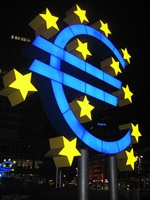Euro zone unemployment holds at record high
10 Jan 2014
Despite a 12-year jump in retail sales in November 2013, Euro zone's unemployment rate continued to remain at a record high level of 12.1 per cent for the eighth month in a row, according to latest data released by the European Union's (EU's) statistical office Eurostat.
 Volume of retail trade in the 18-nation euro zone rose 1.4 per cent in November, compared to October, after registering a 0.4-per cent fall in October and 0.4 per cent drop in September.
Volume of retail trade in the 18-nation euro zone rose 1.4 per cent in November, compared to October, after registering a 0.4-per cent fall in October and 0.4 per cent drop in September.
Compared to last year, retail sales grew by 1.6 per cent, with the bloc's two largest economies Germany and France posting 1.5 and 2.1 per cent rise respectively.
Portugal registered the highest increase of 3.1 per cent in November followed by Luxembourg with 2.3, while Malta registered the maximum fall in trade of 2.1-per cent during the month.
For the 28-nation EU, retail trade expanded 1.2 per cent in November compared to October and 2 per cent on year-on-year.
The euro zone unemployment rate was 12.1 per cent in November, stable since April and up from 11.8 per cent a year ago.
In the broader EU, the rate was 10.9 per cent, stable since May and slightly up from 10.8 compared with November 2012.
According to the estimates, 19.1 million people were unemployed in the euro zone in November, while 26.5 million people in the EU were jobless. Compared with November 2012, the unemployment rose by 452,000 in the euro area and 278,000 in the EU.
The lowest unemployment rate among euro zone member states was in Austria with 4.8 per cent followed by Germany with 5.2 per cent and Luxembourg with 6.1 per cent, while Greece registered the highest figure of 27.4 per cent (in September) and Spain 26.7 per cent.
For comparison, the unemployment rate in the US in November was 7 per cent, down from 7.3 per cent in October and from 7.8 per cent on year-on-year.
The UK's jobless rate dropped unexpectedly to 7.4 per cent in the three months through October, the lowest in 4 ½ years, from 7.6 per cent for the three months through September.
In the third quarter, Euro zone's economy grew 0.1 per cent, below expectations for growth of 0.2 per cent and a slow down compared to second quarter's 0.3-per cent expansion.
Compared to last year, the GDP fell 0.4 per cent in the third quarter after registering a 0.6-per cent contraction in the previous quarter.
However, according to some analysts, a sustainable recovery is not assured as deflation concerns are mounting up.
December inflation remains low at 0.8 per cent, being below 1 per cent for the third consecutive month, while the European Central Bank's (ECB's) target is just under 2 per cent.
The ECB, at its monthly monetary policy meeting yesterday, has kept the bank's key interest rate unchanged at 0.25 per cent.
The bank's governor Mario Draghi said that the euro zone is not at risk of a deflationary spiral similar to Japan and vowed to use all necessary tools to fend off the threat of falling prices, if the situation deteriorates.
''By and large we don't see a deflation in the Japanese sense of the '90s,'' Draghi said. ''We also ask ourselves 'Are we close to Japan?' and the answer we gave ourselves is 'No we are not.'.''
Meanwhile, data released yesterday on the business and consumer confidence in the euro zone indicated its highest level since July 2011, the index improving from 98.4 to 100.


















